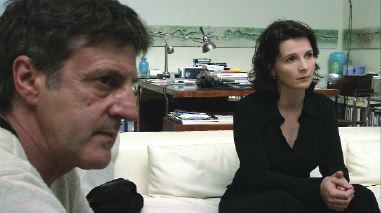Flashbacks

The French film Caché (“Hidden”) is a stylish thriller tiptoeing around a psychological drama that lurks inside a political allegory. This is typical of the challenging work turned out by Austrian writer-director Michael Haneke (Code Unknown, The Piano Teacher), who enjoys presenting confrontational films in which seemingly normal folks leading normal lives turn out to be not very normal at all.
Caché, which won the Best Director Award at last year’s Cannes Film Festival, along with a fistful of other European awards, stars the enigmatic Daniel Auteuil and the luminescent Juliette Binoche as Georges and Anne Laurent. They are a middle-class couple whose lives revolve around words, words and more words. He hosts a television talk show about books; she is a writer who works in publishing.
But chilling visual images soon interrupt their staid literary existence: the Laurents receive an anonymous two-hour videotape that shows nothing except the leafy entrance to their stylish urban townhouse. The scenes are static and nonjudgmental, and in Haneke’s world, plenty creepy. Why would anyone be watching them? Have they slighted someone? Should they go to the police? And what do they tell their 12-year-old son, Pierrot?
Before long, additional tapes arrive, wrapped in thick white paper bearing the rough image of a stick-figure boy coughing up blood. With each nervous viewing of the tapes, more and more of the wall that has protected the Laurents starts to crumble. One of the tapes, shot from a moving car, reconnects Georges to a disturbing incident from his childhood involving an Algerian boy he once trusted and cared for, but whom he later betrayed. Is this boy—now a man the same age as Georges—the one who is sending the tapes? If so, what does he want?
Georges refuses to share any of his findings or suspicions with Anne, who is terrified. He claims that he doesn’t want to worry her, or that the information he’s uncovered doesn’t concern her. But it’s clear that he has begun to retreat inside himself and that the mysterious tapes have reopened a very old, deep wound.
Midway through this mesmerizing film, the complicated story gets more complicated as Haneke throws additional subplots and characters into the mix, including a potential kidnapping, Georges’s suspicious boss, an educated group of dinner friends and, most of all, Georges’s ailing mother (French film legend Annie Girardot), who can still remember parts of the childhood incident that haunts her son.
By the beginning of the third act, the videotapes are playing a smaller role in the story, replaced by Georges’s distant memories of his childhood, which also seem static and cold.
About the time we start to cut Georges some slack, since he was only a child when he committed his sin, Haneke takes the tale to higher ground. The story, we come to realize, isn’t about individual guilt as much as it is about collective guilt, with Georges representing the powers that be, who can deny their complicity all they want, but must still face the music.
Though Haneke doesn’t help us out any more than is absolutely necessary (he believes that audiences should work to solve a film’s puzzle), he does provide an occasional clue. The most telling of these is the film’s final image, which shows a crowd of people coming down a large set of stairs. If you look closely, you can figure out who has been shooting the videotapes. But if you look closer still, the way Haneke believes we all should look, you realize that the identity of the videotaper is no longer as important as Georges’s guilty reaction to the tapes. Check out the left side of that final image to be sure.





